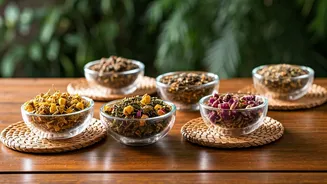Introduction to Ayurveda
Ayurveda, the 'Science of Life,' is an ancient Indian system of medicine that emphasizes holistic health and well-being. It focuses on balancing the body,
mind, and spirit through natural practices. Ayurvedic principles guide us in understanding our unique constitution, or dosha, and choosing foods and herbs that support our individual needs. Herbal teas play a significant role in Ayurveda, offering a gentle yet effective way to introduce beneficial herbs into your daily routine. These teas are often chosen based on their ability to address specific imbalances within the body, promoting both inner health and outer radiance. This ancient approach views beauty as an internal state, reflecting the overall health and harmony of the body.
Triphala Tea's Benefits
Triphala is a classic Ayurvedic formulation comprising three fruits: Amalaki (Indian gooseberry), Bibhitaki, and Haritaki. This powerful blend is renowned for its detoxifying and rejuvenating properties. Drinking Triphala tea can help cleanse the digestive system, promoting healthy digestion and nutrient absorption. The potent antioxidants in Triphala help combat free radicals, protecting the skin from damage and supporting a radiant complexion. Regular consumption can also aid in detoxification, eliminating toxins that contribute to skin issues and promoting overall well-being. The combined effect of these three fruits creates a balanced and effective formula for both internal cleansing and external beauty benefits. This tea is a cornerstone in Ayurvedic practices for promoting longevity and vitality.
Turmeric Tea's Radiance
Turmeric tea, vibrant in color and rich in curcumin, is celebrated for its anti-inflammatory and antioxidant properties. Curcumin is the active compound in turmeric and has been extensively studied for its health benefits. It can help reduce inflammation, a common cause of skin problems like acne and eczema. Drinking turmeric tea can promote clear, glowing skin by combating free radicals and supporting the body's natural detoxification processes. It also aids in reducing the appearance of blemishes and improving skin tone. Furthermore, the anti-inflammatory properties of turmeric may soothe the scalp, promoting healthier hair growth and reducing dandruff. It is usually combined with black pepper, which enhances curcumin absorption, and often blended with other herbs like ginger for additional benefits.
Rose Tea's Calming Effect
Rose tea, known for its delicate fragrance and flavor, offers more than just a pleasant drinking experience. Rose petals are rich in antioxidants and vitamins that benefit the skin. Consuming rose tea can help soothe the skin, reduce redness, and promote a healthy glow. Its gentle properties make it ideal for sensitive skin types, helping to calm irritation and inflammation. The natural compounds in rose tea are believed to have anti-aging effects, reducing the appearance of fine lines and wrinkles. Regular intake of rose tea can also contribute to hydration, which is essential for maintaining youthful and supple skin. The calming properties of rose extend beyond skin health, with the tea helping to reduce stress and promote relaxation.
Hibiscus Tea for Hair
Hibiscus tea, known for its vibrant red hue, is an excellent choice for promoting hair growth and shine. It is rich in antioxidants and amino acids that strengthen hair follicles, reducing hair fall and promoting thicker, healthier hair. Hibiscus also helps to stimulate blood circulation in the scalp, which encourages hair growth. The natural acids in hibiscus tea can gently cleanse the scalp, removing build-up and promoting a healthy environment for hair growth. This tea is also known for its ability to condition hair, leaving it soft and manageable. Beyond hair benefits, hibiscus tea also contains vitamins that contribute to a healthy, glowing complexion, making it a valuable addition to your beauty routine.
Ginger Tea for Skin
Ginger tea, a warming and invigorating beverage, is well-regarded for its health and skin benefits. Ginger contains potent antioxidants and anti-inflammatory compounds that combat free radicals, which can damage the skin. Regular consumption of ginger tea can help improve skin tone and texture, reducing blemishes and promoting a healthy glow. Ginger also enhances blood circulation, which helps to deliver nutrients to skin cells, supporting their vitality. The anti-inflammatory properties of ginger can soothe irritated skin and reduce redness. This tea is a great option for those seeking a natural approach to achieving radiant and healthy skin. Ginger also aids in digestion, which is crucial for overall skin health.
Neem Tea's Antiseptic Powers
Neem tea, derived from the neem tree, is a powerful Ayurvedic remedy known for its antiseptic and antibacterial properties. It helps to purify the blood, eliminating toxins that contribute to skin issues like acne and eczema. Drinking neem tea can help reduce inflammation and soothe skin irritations. The strong antibacterial qualities of neem can assist in fighting off acne-causing bacteria, promoting clearer skin. Neem tea also promotes a healthy scalp, reducing dandruff and encouraging hair growth. While it has a bitter taste, its many benefits make it an excellent choice for those seeking to treat skin and hair concerns naturally. Neem is a key element in Ayurvedic dermatology for its cleansing and healing effects.













